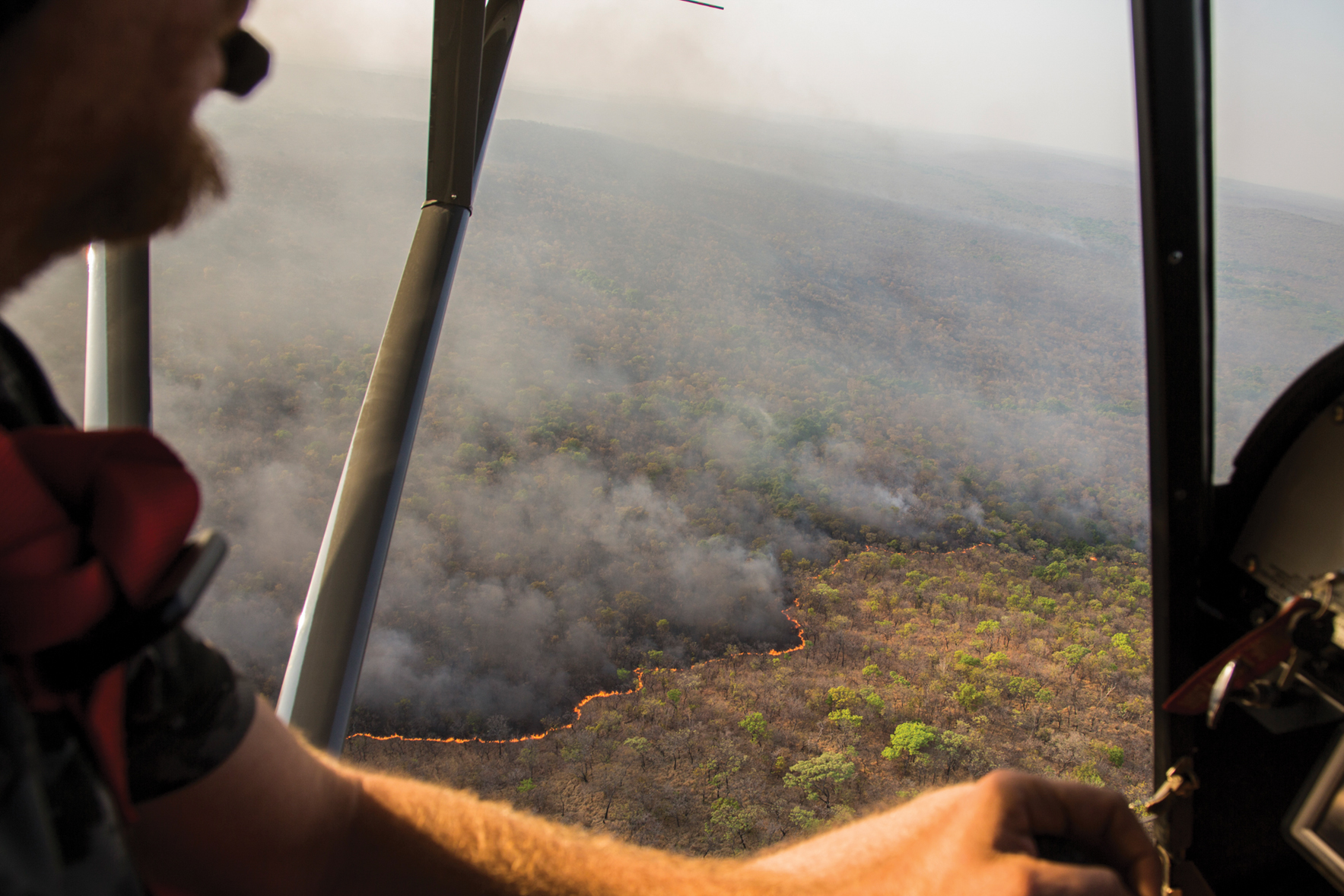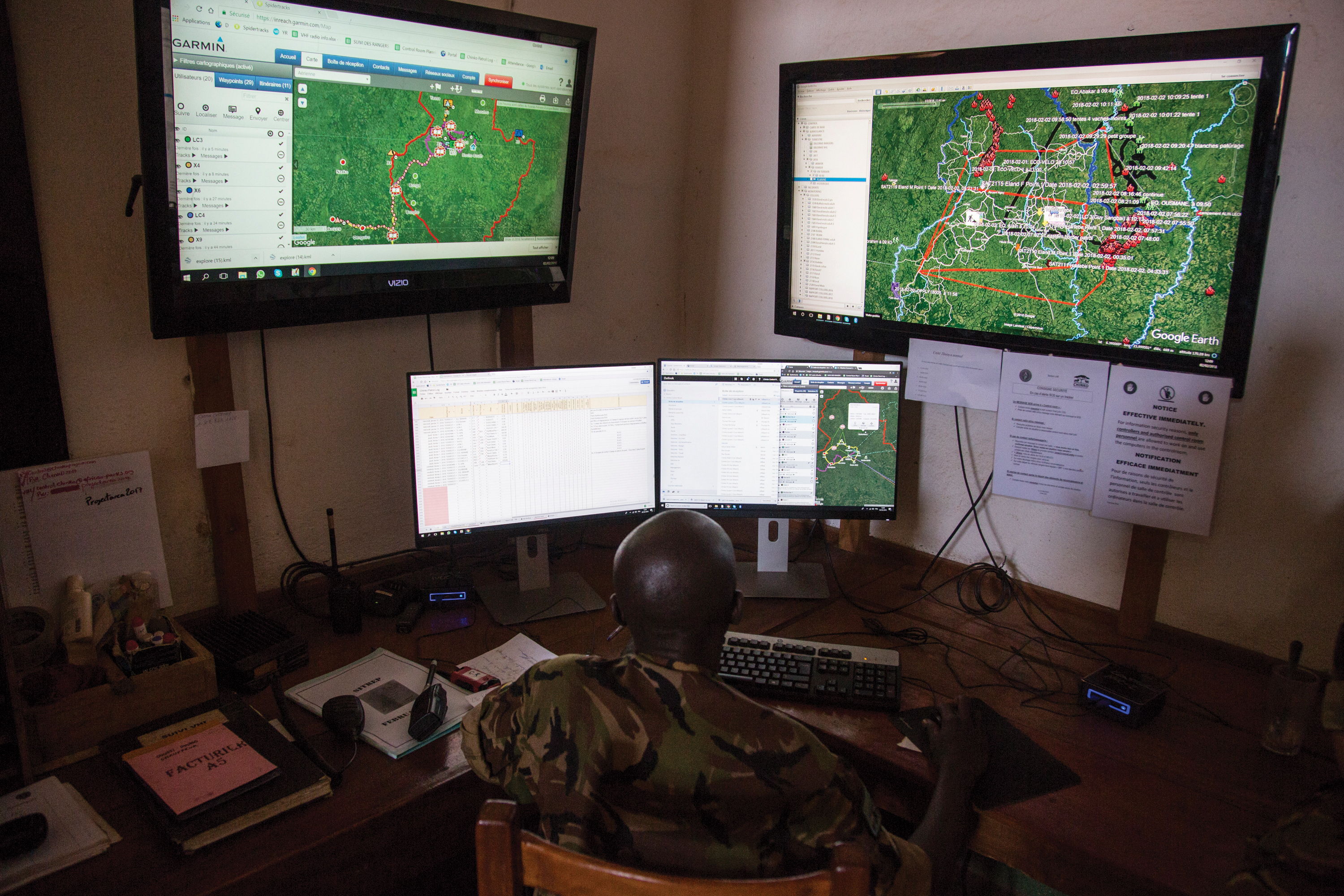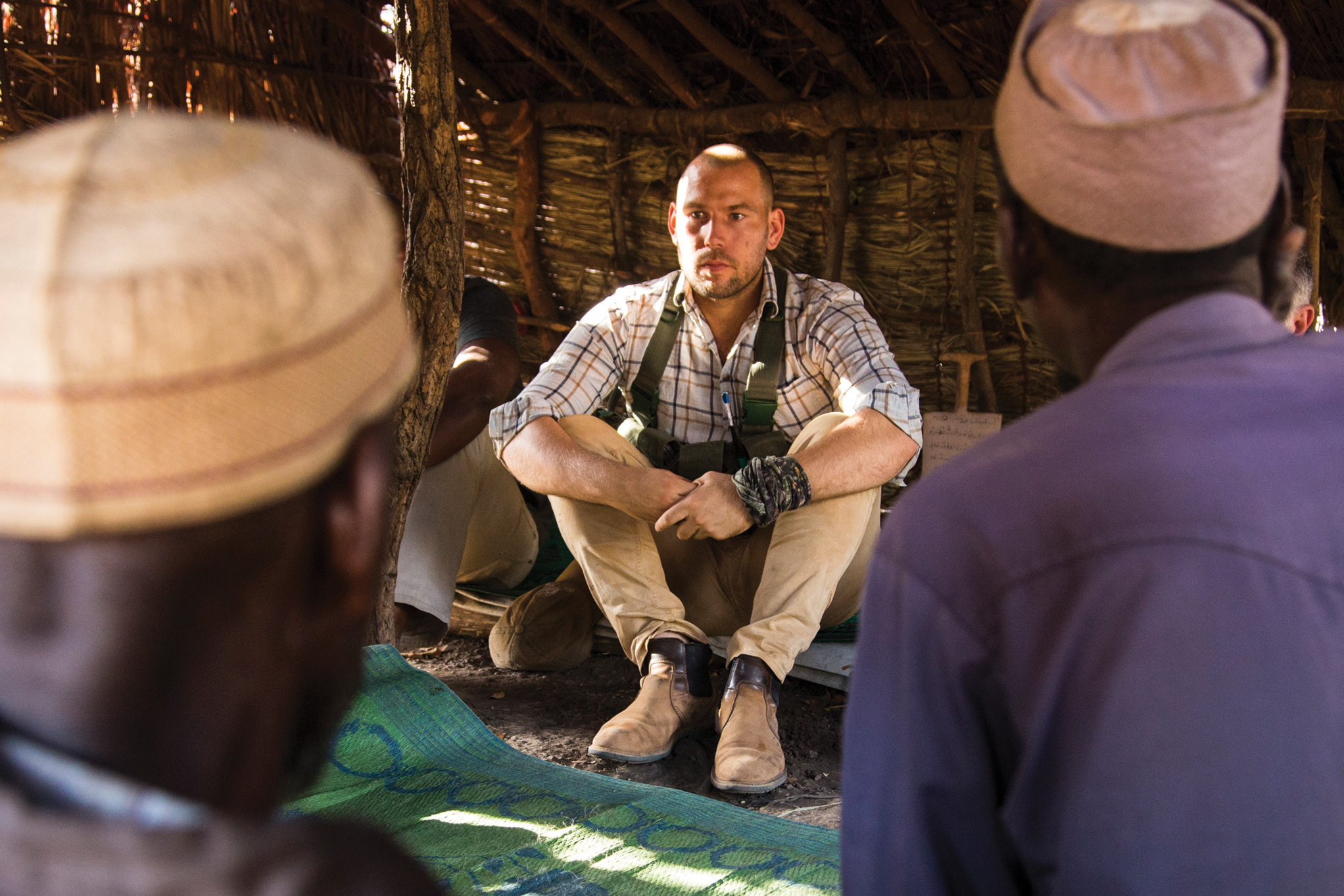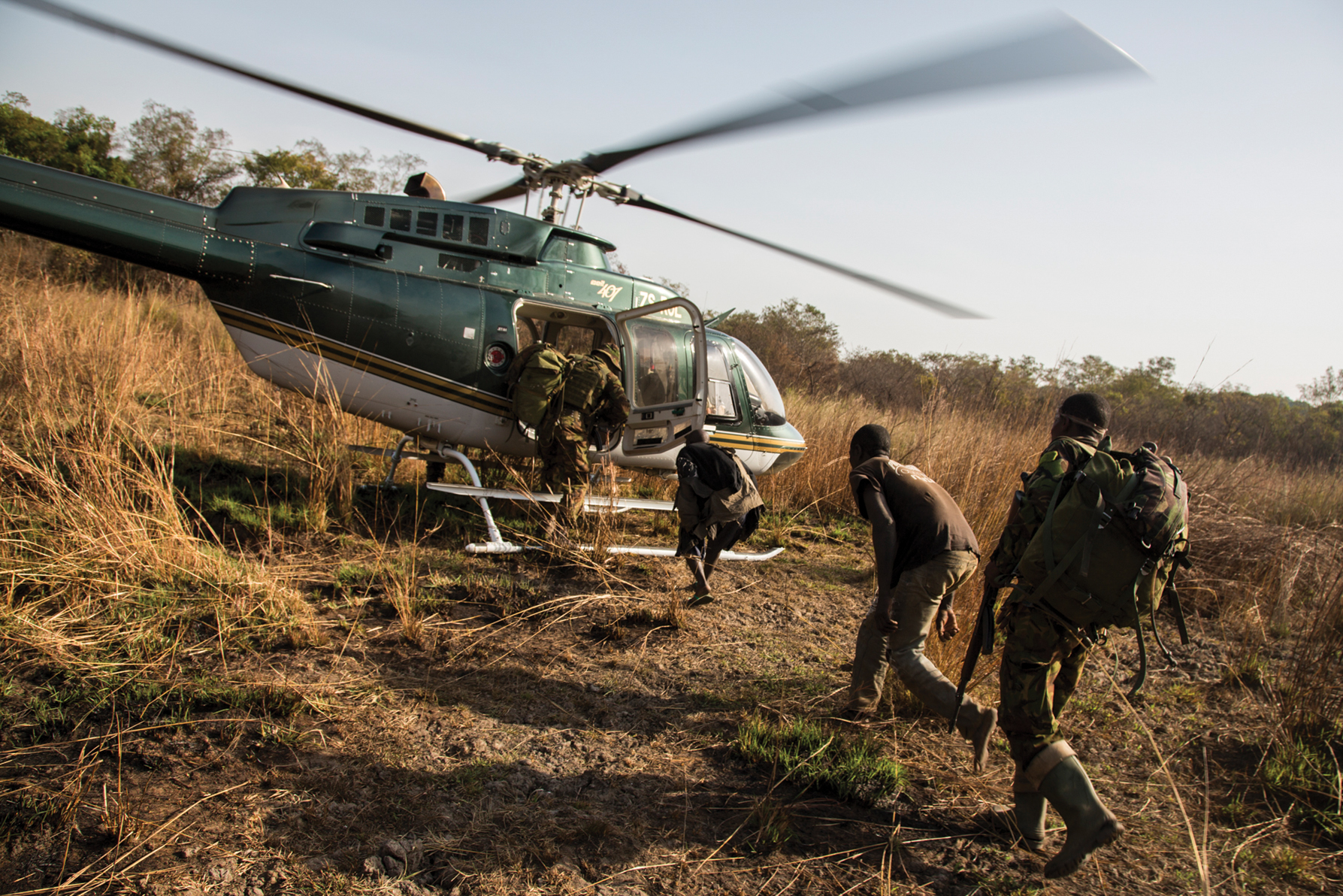This story appears in VICE magazine’s Dystopia and Utopia Issue. Click HERE to subscribe.
As wind whips through an open cockpit, the bush plane banks eastward above the red earth of central Africa. Columns of black smoke tower on the horizon—the calling card of armed cattle herders. The dry season is their time to escape the arid Sahel in search of pasture for their enormous droves—burning forest and poaching wildlife along the way. But they are not the only intruders. A bullet hole in the plane’s wing from a guerrilla’s potshot is a reminder that the Lord’s Resistance Army (LRA) still operates in these badlands, where war is again intensifying. The pilot, Cédric Ganière, peers into the hot, darkening haze. “There is nothing romantic about this,” he says. “They are destroying a country that isn’t theirs. The fox is in the middle of the chickens. It is just kill, kill, kill.”
Videos by VICE
This is the front line in the battle to save Chinko—one of the largest intact wildernesses in the heart of Africa. The reserve, deep in a remote corner of the war-torn Central African Republic (CAR), lies near borders with Congo and South Sudan. Sitting on an ancient volcanic plateau, the area supports an extraordinary mix of species thanks to a fusion of Congolian rainforest and wooded savannah, nourished by underground wells that feed an expansive network of waterways. This patchwork has created a vital paradise, home to hundreds of bird species and imperiled populations of megafauna—lion and leopard, chimpanzee and antelope, hippo and buffalo, wild dog and golden cat. Devoid of human habitation, it is one of the last holdouts for the country’s endangered elephant population.
But this enchanted Eden is under siege. A protracted civil war is escalating in the region—a brutal and forgotten conflict that has prompted warnings of genocide from the UN. Militarized poacher units have plundered the park to feed the lucrative, insatiable demand for bushmeat, ivory, animal skin, and traditional medicine. Miners illegally dredge riverbeds for diamonds and gold. And the slash-and-burn tactics of nomadic herders, who kill game to supplement their meager rations and salary, threaten a fragile ecosystem.
Within this maelstrom, a group of conservationists is fighting to protect Chinko. Leading this resistance is David Simpson, a charismatic 30-year-old and the park’s manager. His hunger for adventure led him to quit his factory job in the United Kingdom and move to the wilds of central Africa to work for a big-game hunting firm before transforming the area into a unique sanctuary.
Covering an area almost twice the size of Yellowstone, Chinko has since become a mini-state within a failed nation-state. The biggest employer outside the capital of Bangui, Chinko hires hundreds of locals (including reformed poachers) as rangers, builders, farmers, mechanics, and medics. But the park’s survival hangs on the fate of a chronically unstable region. Renewed conflict could wipe out everything Simpson and his cadre are dedicated to protecting.
***
High above the smoldering bush, Ganière calls the control room where NASA-made software plots each blaze on a Google Earth map. This nerve center and two small aircraft are Chinko’s eyes. Units of armed, camouflaged rangers below: its fist.
The tiny plane drops into a gut-wrenching turn toward base. On landing, Ganière spots Simpson, near the dirt airstrip chatting with a group of workers in Sango, the local language. This is a rarity for munju, or white foreigners, who, at best, typically learn a couple of phrases, then opt for French, the tongue of the country’s despised former colonial master.

Wearing desert boots, tan chinos, and a checked shirt, Simpson has a coppery glow at odds with his origins in England’s leaden, drizzly north. His accent is an unusual blend: no-nonsense Yorkshire with a southern African twang. He is direct yet understated, with a light, good-humored touch, at ease holding court during Chinko’s nightly group dinners.
“People make conservation complicated,” says Simpson. “It’s not complicated. You just stop the people killing the animals, and then you’re done. How much do I deal with animals on a daily basis? Zero. I deal with people. Sort that out, and the animals are fine.” He pauses. “I wish it was just about animals, though. It’d be much fucking easier.”
The area around the Chinko River was not always a wildlife reserve. From 2005, it was administered by an isolated hunting ranch called Central African Wildlife Adventures, which ran high-end shoots on strict quotas for wealthy tourists. Simpson became general manager in 2011. Soon after, things began to fall apart in the region. Sudanese poachers and LRA rebels had already decimated the once-abundant elephant population; well-armed poaching groups were now butchering the remaining wildlife. “A client would be getting ready to shoot a giant eland, then a whole load of AK-47s would go off nearby and slaughter the entire herd,” recounts Simpson. “We once found an eland with eight AK bullets in it and was still going.” Buffalo were being annihilated; lion prides, poisoned.
In March 2012, Simpson and his team came across 13 victims of an LRA massacre near an illegal gold mine. Their skulls were crushed, and bodies hacked with machetes. He and Erik Mararv, the concession’s founder, went to the capital to answer questions as witnesses but were instead arrested for murder and jailed in a filthy, overcrowded prison. They later learned that an official involved in the ivory trade had pinned the murders on them.
Languishing in prison, the pair realized that the area around the Chinko River needed to be transformed into a wildlife sanctuary. “We had to protect it,” says Simpson. “It was under attack.”
***
Six months later, the trumped-up charges were dropped, and Simpson reunited with his parents in the UK. After three weeks, he and Mararv headed back to eastern CAR to begin the transformation. At first, Simpson says, his team, armed only with hunting rifles, faced poachers carrying AK-47s. But Chinko’s capabilities began to expand after securing funding and, in 2014, coming under the aegis of African Parks—a conservation nonprofit that has national parks covering 10.5 million hectares. A key objective was to clear the reserve of foreign pastoralists. Each dry season, hundreds of thousands of cows are herded south from Chad and Sudan in search of fresh vegetation, a yearly practice known as transhumance, now intensified by drought, desertification, and war.

This tradition has existed for centuries but has altered radically with the proliferation of weapons and involvement of cattle barons who use cows as roving bank accounts. Desertification and conflict across the Sahel have pushed foreign pastoralists deeper into CAR and the Congo as they seek out verdant terrain, especially grasslands away from armed groups who levy taxes on migrating cattle. The animals overgraze land, spread disease, and devastate dry-season soil amid uncontrollable fires that are lit by herders to clear dense brush and encourage new grass growth.
Such mega-herds—each up to 800 strong—pass through the Chinko region. Park rangers have clashed with herders in shootouts, seizing weaponry and veterinary medicines. But diplomacy is preferred. Local negotiators meet with gun-wielding nomads over tea to encourage them to bypass the reserve through a specially designated “corridor,” marked by yellow plastic bags tied to trees. The herders are given food supplies if they don’t stray off the path. “Confidence does not come quickly, but we have started the process of communication,” says Chinko’s lead negotiator, himself the grandson of a cattle trader.
Surprisingly Chinko’s personnel also includes Hervé Ngambo, a short, unassuming man in his late 30s who, from the age of 15, worked as an elephant poacher. “In the bush, I would slowly approach the elephant until I was as close as possible,” he tells me one morning. “Then I would shoot it in its head, ears, or heart.”
At the start, Ngambo says he could leave his village and find an elephant the same day. A decade later, it took him weeks. Mass poaching was taking its toll. “I always had to come home with something. If I didn’t find an elephant, I’d kill a buffalo or other animals. We’d sell some parts and go back out as soon as possible.”
Elephants were the most valuable quarry. Each time he killed one, Ngambo called his contact, a man from CAR, who bought the ivory to sell to foreign dealers. Ngambo says a pair of tusks plus the meat could bag his five-strong hunting team more than $700—a decent sum in this desperately poor region. He claims he killed well over a hundred but has lost count.
As wildlife numbers plummeted, Ngambo struggled to make ends meet. Living near the Chinko boundary, this lifelong hunter was familiar with the park and embarked on a dramatic career change, joining the reserve in 2014 to track wildlife and poaching activity. “I stopped hunting because there were no animals left. I thought Chinko was good because I want my grandchildren to see elephants. Before, I needed to make money and there was no other work. Hunting was just a job. Now I am committed to protecting these animals.”
But only so long as Chinko exists. Ngambo said, “In my community, there is nothing. There is no work. If Chinko stopped tomorrow and I didn’t get a salary, I would have to go back to hunting.”
***
In the heat of a cloudless February afternoon, the helicopter races over Chinko’s savannah, a parched expanse interspersed with snaking trails of gallery forest, seemingly empty of all human life. That is, until the tents come into view.
Several dozen shelters cluster among charred trees. The thump of rotors draws out dozens of figures who disappear amid clouds of billowing dust. Simpson and his deputy, Evelyne Malfliet, step out to face a host of women and children wearing headscarves and vibrant dresses. They are Fulani—Islamic pastoralists by tradition and, in the case of this exiled community, survivors of savage sectarian violence.
Simpson and Malfliet walk through the desolate, makeshift village toward a small thatched hut where they meet with elders. The plight of this community can be traced back to the outbreak of civil war in late 2012, when a majority-Muslim coalition of rebels known as the Séléka advanced on the capital and overthrew the government, committing atrocities on their path to power. Militias composed largely of Christians—the anti-balaka—fought back. Clashes across the country killed thousands.

The Séléka were eventually ousted, splintering into rival factions that now control some 80 percent of this mineral-rich country. Violence surged again in late 2016, compounding the humanitarian crisis and uprooting hundreds of thousands of people. One of them was Amadou Boukar, who, in March 2017, awoke before dawn to militants attacking his town, Nzako. “They killed lots of people—women and children,” says Boukar, a 41-year-old former shopkeeper and a father of five. “The attack lasted all day.”
Around 380 civilians fled into Chinko, where park staff gave them food and shelter, later relocating them deep in the savannah where the sheer remoteness offers protection, though hyenas and lions stalk their camp at night. “We would have nothing without Chinko,” Boukar continues. “We could not survive alone. But look at these children. There is no school. This is no future for them. We want to go home more than anything. All we need is peace.”
Chinko is a beacon in one of the world’s darkest corners, bringing order and employment in a time of chaos. It fills the void left by a wholly absent state, sending the park’s medical staff into the community and paying for 50 teachers who reach more than a thousand children. At stake is not just the ecology of the region—it’s the people, too.

“The conditions needed for people to thrive are the same conditions for wildlife and ecosystems to thrive,” says Peter Fearnhead, the CEO of African Parks. “If you have an ungoverned area where natural resources are being exploited in an illegal manner, this contributes to the cycle of poverty.” Well-managed reserves, he says, “can radiate a system of good governance over a very, very large area.”
Despite the existential threats and tortuous logistics of keeping Chinko afloat, Fearnhead believes it presents “one of Africa’s greatest conservation opportunities.” Already, against the odds, wildlife is bouncing back. “In CAR, you have this big black hole filled only with tragedy. Chinko portrays hope in a situation where everything is stacked up to be doom and gloom. We are not allowing Eden to be lost. We are in the process of bringing Eden back.”
***
Swaddled in khaki fatigues and a desert scarf, Stefan Maritz, Chinko’s acting assistant law enforcement manager, waits on the airstrip for takeoff in the 95-degree heat. This burly South African, a former lance-corporal, goes on leave tomorrow. Before his departure, there is one last task.
The day before, rangers found a poaching camp, uncovering a haul of carcasses—buffalo, crocodile, giant forest hog, monkey, water buck, and hippo (its teeth, a valuable substitute for elephant ivory). The rangers lay in wait for the poachers’ return, later catching five of them, confiscating shotguns, rifles, machetes, and a large cache of ammunition. These men are suspected to be part of a larger operation, backed by a wealthy businessman.
The chopper takes off and pushes to the south. “Our mission is to fight the wrong,” says Maritz. “In Chinko, there is authority. There are consequences for what you do. Once accountability falls away, nothing works anymore.”
Fifty miles on, the helicopter descends in a forest clearing. Carrying his Kalashnikov, Maritz greets two rangers who emerge from the scratchy, sun-scorched grass escorting two poachers, one of whom wears flip-flops; the other, barefoot and hobbling. For a fortnight these men have slept rough in the forest amid clouds of mosquitos and tsetse flies.
In a patch of shade, I ask them why they’re here. “This is the only way I can make money for my family,” responds Constant, a father of one in his late 30s whose wife is pregnant with their second child. He says he has been working here independently without support for two weeks and insists he wasn’t aware of Chinko’s boundaries. The rangers shake their heads. “There is no work in my village. There are no opportunities. I do this to survive.”
The two men stare into the trees. Constant seems resigned, strangely calm. The other, Kinimapé, looks forlorn—his eyes, bloodshot. After days of pursuing faceless villains in the bush, this is a strange meeting that only blurs the line between good and bad, between greed and desperation.
The rangers lead the men to the helicopter. It thuds back to base where the men are frogmarched to a holding cell for questioning. Three days later, they will be transferred to Bangui to enter the country’s decrepit justice system. Poachers can be jailed for up to ten years, but this is no real indication of the fate of these men. Whoever funded this poaching trip may let them languish behind bars, or pay off the cops and deploy them once more.
The sun slides behind a canopy of dark forest. The sky is a deep, bruised purple, slashed with red. The air is cooler now. After the day’s drama, Simpson is wrapping up before lights-out. He’ll be up by 5:30 AM tomorrow to do it all again.
“Give it five to ten years, Chinko will be the jewel of African Parks,” he says. “This could be a thousand-lion park. We could have 100,000 buffalo. We’ve now created some stability. If we keep on, we’ll see more development. Then, in time, hopefully, peace.”
Reporting for this story was supported by a grant from the Pulitzer Center on Crisis Reporting.




